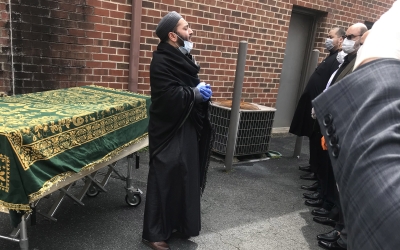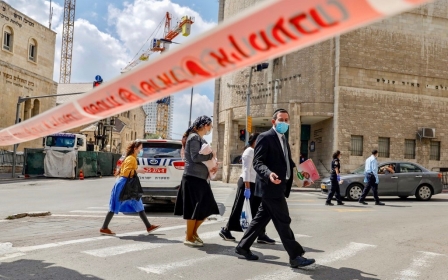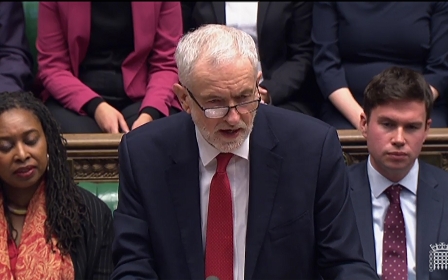New York City mayor accused of 'singling out' Jews after breaking up funeral procession

New York City Mayor Bill de Blasio was accused of singling out the city's Jewish community for blame after ordering a Hasidic Jewish funeral to be dispersed and threatening to fine or arrest residents who continued to defy social distancing rules.
Lawmakers, city council members and Jewish rights groups slammed De Blasio for his comments, saying he generalised about New York's 1.1 million Jewish residents after photos went viral of a crowd of mourners at Rabbi Chaim Mertz's funeral.
While activists reported hundreds attended the funeral of the rabbi, who died after contracting the coronavirus, the mayor's office said the gathering was in the thousands.
Middle East Eye reached out to several local Jewish groups but was unable to independently verify the size of the procession.
De Blasio called the funeral gathering "absolutely unacceptable", leading him to show up at the memorial himself "to ensure the crowd was dispersed".
New York authorities have broken up several religious gatherings since coronavirus restrictions were put in place, but this appears to be the first time the mayor has shown up in person to take charge of such an event.
"What I saw WILL NOT be tolerated so long as we are fighting the Coronavirus," de Blasio tweeted.
"My message to the Jewish community, and all communities, is this simple: the time for warnings has passed," de Blasio said in a second tweet. "I have instructed the NYPD to proceed immediately to summons or even arrest those who gather in large groups. This is about stopping this disease and saving lives. Period."
The tweet sparked outrage across the social media platform, sending the words "Jew" "Jewish" and "Hasidic" to the top of Twitter's trending chart in the US on Wednesday.
The Orthodox Jewish Public Affairs Council posted a string of criticisms throughout the day, pointing out the different ways in which de Blasio - sometimes referred to as BDB - unfairly targeted New York's Jewish community, while seeming to have no qualms with other large gatherings that have been reported.
Earlier on Tuesday, huge crowds had come together across New York to watch a military flyover tribute honouring essential workers, leaving many who took offense to de Blasio's tweet to speculate as to why it was the funeral, and not those gatherings, that caught the ire of the mayor.
"BDB says he became angry for seeing recklessness in front of his eyes. Exactly the problem. Why were his eyes only on 300 Hasidim (mostly in masks) and not on what has been going on all across the city all day? Namely, thousands failing to social distance," the group said on Twitter, attaching several images of New Yorkers gathering for the aerial demonstrations.
De Blasio responds to criticism
On Wednesday, de Blasio defended his remarks at a news conference, rejecting the comparisons.
"I understand politicians, everyone has said, 'oh look, you know, this is like people gathering in the park,'" he said. "No, it’s not like people gathering in the park, it was thousands of people, can we just have an honest conversation here?"
De Blasio said his remarks on Twitter came "out of passion" and "real distress".
"People's lives were in danger before my eyes and I was not going to tolerate it,” he told reporters. "I regret if the way I said it in any way gave people a feeling of being treated the wrong way, that was not my intention. It was said with love but it was tough love, it was anger and frustration."
Still, he denied that he has unfairly targeted the Jewish community or that his comments may have reflected a double-standard.
"It has not happened other places, let’s be honest," he said. "It was not acceptable."
New York City Councilman Kalman Yeger responded to de Blasio's comments, saying it was the mayor's words that were "unacceptable".
"To condemn our entire community over one group of people is something you would not do to any other ethnic group, and I know you long enough to know that you know this," the councilman tweeted.
Many users had similar objections, insisting the mayor would not have made such comments about other groups.
Brad Lander, another city councilmen, agreed that the gathering at the rabbi's funeral in Williamsburg "was totally unacceptable", but still condemned the mayor's message.
"This is really a bad response from @NYCMayor — both for stereotypically lumping together & singling [out] the Jewish community for criticism AND for threatening arrests, as though over-policing is the solution," Lander said.
The New York Police Department has a long history targeting minority groups in the city, including a decades-long stop-and-frisk policy, which specifically targeted Black Americans and Latinos.
Following the attacks on 9/11, then mayor Mike Bloomberg launched a campaign against New York's Muslim community, directing a special police force to secretly map the Muslim community, sending informants to mosques to watch religious sermons and to cafes to listen in on conversations, among other extreme measures.
New York has been on a state-wide lockdown - with gatherings of any size banned in the state - for more than a month, as the region struggles to curb the spread of the coronavirus.
Accounting for almost a third of the US's one million coronavirus cases, New York state has reported more than 300,000 infections and about 23,500 deaths, with New York City accounting for half of the state's death toll.
Middle East Eye delivers independent and unrivalled coverage and analysis of the Middle East, North Africa and beyond. To learn more about republishing this content and the associated fees, please fill out this form. More about MEE can be found here.





